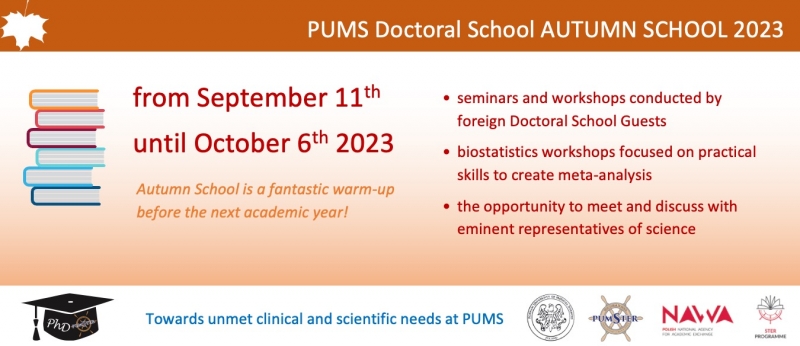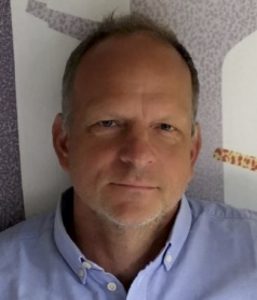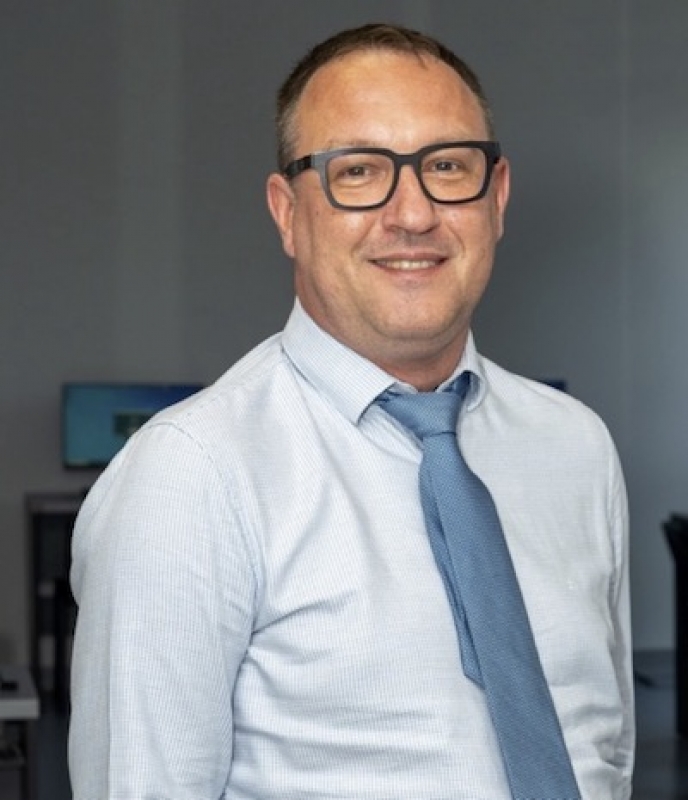AUTUMN SCHOOL 2023 – 11 Sept – 6 Oct 2023

Let’s warm up before the winter semester of 2023/2024! We invite you to actively participate in meetings with our Guests and Friends of the PUMS Doctoral School, who will help us strengthen our belief that building a bridge between theory and practice is not an idée fixe. We are pleased to introduce the speakers of this year’s edition of the “Autumn School”
Invited Speakers
Piotr TOPILKO

Professor of Histology and Embryology and head of the group “Neurofibromatosis type 1”, that is part of Team 9 “Neurofibromatosis and lymphoma oncogenesis”, at Mondor Institute for Biomedical Research at Creteil, France. Until 2019 he was appointed director at INSERM and head of the group “Development of peripheral nervous system” at Institute of Biology (IBENS) of the Ecole Normale Supérieure (ENS) in Paris. The ENS is an elite, multidiciplinary institution within the high education French system, evaluated as the first French University in the Times classification. He is leading outstanding research on Schwann cells, sensory neurons, neural crest derived boundary cap (BC) cells and more recently neurofibromatosis type 1 (NF1). In the middle nineties, he identified Krox20 transcription factor as a master gene controlling Schwann cells myelination. He discovered novel type of peripheral glia, BC cells that are transiently located at the interface between central and peripheral nervous system. He showed that BC cells, plays multiple and key functions during development as a source of glia and sensory neurons to the developing PNS, and as a gate keeper by preventing escapement of motor neurons from the neural tube. For these achievements he obtained in 2004 the prestigious prize of the Foundation of France. Recently, his team discovered that BC derivatives migrate along the nerves to the skin, then detached from nerves and gives rise to mural cells in the skin vascular network. At present, his major research topics focuses on NF1. Recent observations by his team point to BCs as cells at the origin of plexiform and cutaneous neurofibromas in NF1 disease. His team recently set up a mouse model carrying Nf1 loss in BC cells that faithfully recapitulate several aspects of human disease including cutaneous, plexiform neurofibromas including their malignant progression, bone and eye lesions, café au lait macules and brain alterations. Exploring this model shed a new light on the mechanisms governing pathogenesis of neurofibromas making this model well suited for drug screening and validation studies.
He has published 80 publications in high-ranking international journals including first or last author positions in Cell, Nature, Nature Neuroscience, Neuron, Journal of Neuroscience, Development, Cell Stem Reports and Cancer Discovery. Over last decade he has been actively involved in training neuroand developmental biology fellows, graduate and medical students. Finally, as inventor, he developed innovative equipment for research in science, that are used by academics and private laboratories across Europe.

I graduated at the Faculty of Pharmacy of Charles University in 1987 and immediately after that I started working at the same faculty. My field of investigation and teaching has been pharmaceutical analysis right from my beginning. Over the years I have taught many students at the mother faculty, I also have experience teaching this subject at a cooperating College in Crete, Greece. I participate in teaching in the form of lectures, seminars, practical exercises, supervising of diploma theses, regular exams, and state exams. I also participate in the approval examinations of foreigners.
During my career, I completed several one-month stays at abroad universities in Germany, and the last internship was in Poland.
I am a member of one of the Groups of Experts of the European Pharmacopoeia Commission, which is based in Strasbourg, France.
My research activity focuses on the use of HPLC for the evaluation of the active pharmaceutical ingredients and pharmaceutical preparations, I deal with stability studies. In addition, I cooperate with the scientific group of Professor Štaud of our university, which investigates the metabolism of serotonin in connection with the placenta. For this group, I carry out analytical determinations of it, serotonin metabolites and precursor. This research resulted in many high-quality publications where I am listed as a co-author; last accepted paper in current year was in Reproductive Biology and Endocrinology with ranking in the 1st quartile.
Piotr GOLKIEWICZ

Born in Poland, graduated from University of Lublin at the Faculty of Chemistry. Post-graduation Piotr worked for 5 years at the university as a researcher and university teacher in chemistry.
In 1991 Piotr left academia to practice business skills in various international companies.
In 2006 Piotr joined Elsevier, thus returning to his scientific roots.
He worked at various positions related to scientific journals, e-books and databases.
Since 2014 Piotr is supporting Life Science portfolio of Elsevier in Central-Eastern Europe, currently at the position of Customer Consultant Life Sciences.
Apart from native Polish language, Piotr communicates fluently in English and speaks Russian at conversational level.
Emmanuel CALLENS

Dr Emmanuel Callens is currently a Principal Scientist at a BioTech, 30 Technology based in London.
He completed his PhD in Chemistry in 2008 at Imperial College under the supervision of Prof. Barrett. Following his PhD, he worked initially for a CRO, BioFocus in medicinal chemistry and then went to be a Research Associate in the area of “Surface Organometallic Chemistry” in France. He then accepted to be a Senior Scientist in a challenging new lab with state-of-the-art equipment for high throughput experimentation at KAUST (Saudi Arabia). After managing multiple projects leading to peer-reviewed publications in different fields (supported single-site catalysts employing surface organometallic chemistry, CH-activation of alkanes and other heterogeneous catalytic systems), he worked as a radiochemist in London. Recently, he has accepted a position as a principal scientist in 30 Technology. He is currently dedicated to making a scientific contribution to the discovery of new therapies and diagnostics to advance the treatment of patients in different therapeutic areas.
He has co-authored well over 30 publications. He is also a chartered member of Royal Society of Chemistry and a member of Society of Chemical Industry.
Eduardo DE MELO CORVACHO

Eduardo has a Master’s Degree in Pharmaceutical Sciences from the Faculty of Pharmacy of the University of Lisbon. During his studies, he developed several research projects, namely in the area of toxicology & breast cancer, one of which won an initiation to research scholarship by the Amadeu Dias Foundation, and embarked on various short-term research internships abroad. He also has a complementary Master’s in Management from Católica Lisbon, which positions him at the intersection of science and strategic thinking.
On September 19th, Eduardo will aim to uncover the concept of pharmaceutical marketing, identify where commercial roles play a part in the drug life cycle, and how advanced education can become a competitive advantage for those that might want to pursue careers in this area, offering a unique perspective that bridges theory and practice.

Further professional activities:
– since 2011 – Chair of the APOH Working Group of CESAR (Central European Society for Anticancer Research
– 2010-2013 – Deputy Director of the Doctoral Studies Programme Life Sciences, Faculty of Life Sciences, University of Vienna
– since 2013 – Director of the Doctoral Studies Programme Life Sciences, Faculty of Life Sciences, University of Vienna
Worked experience abroad
– 1992-1993 – Postdoctoral training at the Department of Biopharmaceutics (Prof. L.Z. Benet, University of California San Francisco, USA) by an Erwin-Schrödinger Research Grant (“The pharmacokinetics and metabolic aspects of immunosuppressive agents”)
Peer review activities, editorship, memberships in scientific organisations
Editorial Board Member: Experimental Pharmacology and Drug Discovery, In Vitro Drug Research; ISRN Pharmacology; Scientia Pharmaceutica; The Open Drug Metabolism Journal; The Open Enzyme Inhibition Journal; Integrated Pharmacy Research and Practice, Journal of Pharmaceutical Analysis, Journal of Analytical Oncology; Xenobiotica
2015 Guest Editor of the special issue “Anticancer Properties of Natural Products” of BioMed Research International
Referee for more than 20 scientific journals (incl. Molecular Nutrition and Food Research, Pharmaceutical Research, Journal of Experimental Pharmacology and Therapeutics, European Journal of Medicine, Journal of Proteome Research, Journal of Agricultural and Food chemistry, PlosOne)
Memberships: Austrian Pharmaceutical Society, German Pharmaceutical Society, European Society of Clinical Pharmacy, Central European Society for Anticancer Drug Research, International Society for the Study of Xenobiotics (ISSX)
Professional activities:
– since 2011- Chair of the APOH Working Group of CESAR (Central European Society for Anticancer Research
– since 2010 – Deputy Director of the Doctoral Studies Programme Life Sciences, Faculty of Life Scieces
since 2013 Director of the Doctoral Studies Programme Life Sciences, Faculty of Life Scieces Editorial Board Member: Journal of Pharmacy and Pharmaceutical Sciens, Frontiers of Pharmacology, Xenobiotica, Integrated Pharmacy Research and Practice, Journal of Pharmaceutical Analysis, Journal of Analytical Oncology, In Vitro Drug Research; ISRN Pharmacology; Scientia Pharmaceutica; The Open Drug Metabolism Journal; The Open Enzyme Inhibition Journal
Research Interests:
(1) Identification of drug metabolizing enzymes and cellular transport proteins for bioactive natural and synthetic compounds
(2) Investigation of molecular targets for novel anticancer drugs
(3) Drug monitoring and pharmacokinetics of drugs und their metabolites in animal models and patients
(4) Targeted metabolomics in human tumor cells and tissue samples
Publications – 297 original scientific papers, 8 review articles; 4 book chapters, 6 patents, ~5340 citations; h-index: 37;
https://ucris.univie.ac.at/portal/en/persons/walter-jager(3c678904-3ba5-49c9-b402-2da78535e74f)/publications.html

Dr. Scheiper was born and raised in Münster/Germany and studied chemistry at the Universities of Münster/Germany and Toledo(Ohio)/USA. After completing his diploma thesis at the University of Münster under the supervision of Prof. Hoppe in 2002, he continued his graduate studies under the direction of Prof. Fürstner at the Max Planck Institut für Kohlenforschung/Mülheim(Ruhr), where he obtained his Ph.D. in 2005. During his postdoctoral studies at the Imperial College/London he gained extensive experience in drug discovery in the group of Prof. Barrett. He is one of the main inventors of Samuraciclib, a cancer drug candidate in phase II clinical trials. Before starting his career as an IP professional, Dr. Scheiper worked 5 years at Sanofi-Aventis/Frankfurt(Main) as a medicinal chemist and project leader, where he was responsible for 3 synthesis laboratories as well as the coordination of German-French and German-US-American research teams in several Med-chem projects.


